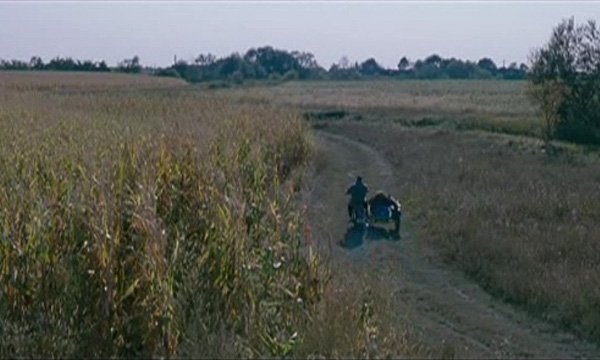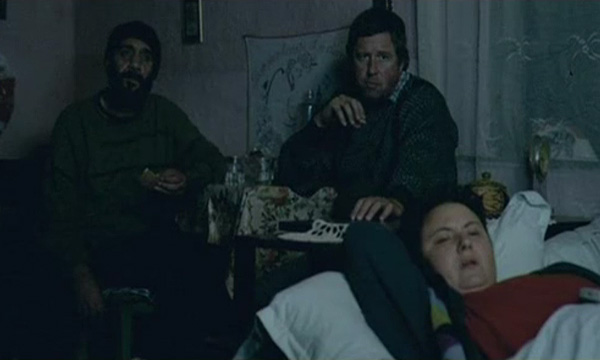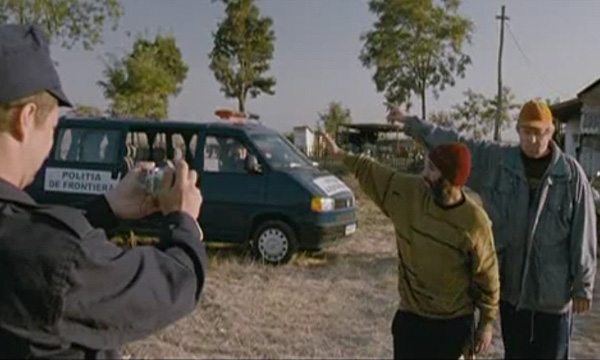Nelu Manciu is a simple man living in Salonta, Romania, near the Hungarian border. His greatest passion is fishing, so he often crosses the border in his fishing trips. Nelu, who works as a security guard for a local supermarket, has a grumpy wife named Florica and a leaky roof. They both live in the coutryside and their everyday’s life is rather grim. Nelu’s life is so insignificant that fishing for him represents the only source of excitement. While he’s fishing, one day Nelu comes across a nameless man speaking a foreign language that he finds out to be Turkish. The little man looks truly miserable, but his pleading is so desperate that, despite his initial opposition, Nelu brings him home and offers him board and lodging. The Turkish man, Berhen, is an illegal trying to cross the border with Hungary in order to reach his son, who is living in Germany. He has no rights or authorizations, and for the law he’s punishable by being sent back to his home country. The two men, although their backgrounds and existences are so different, find a common ground that brings them together.
Morgen is a film about the importance of human bonds. Nelu and Behren apparently have nothing in common: one is in his own way an adjusted man with a steady job and a family, while the other is an illegal whose family has left behind and who is unable even to prove his identity. Nelu and Behren, though unable to communicate, seem to understand each other very well: they establish a bond based on empathy that goes beyond limitations of commonly spoken languages. As the story develops, Nelu in particular seems to grow attached to Behren’s cause. Following Nelu’s logic, as a man Behren has the same rights as anybody else, in spite of his nationality, to pursue happiness. But Behren’s cause is valueless for any authority; he’s just a number in the count of illegals trying to pass a border. Both Behren and his protector have to devise the most bizarre strategies to help the Turkish man achieve his dream without getting into trouble.



In Morgen authority is the enemy. But authority is made by men, so basically any man is a potential enemy. Nelu’s logic clashes with men and their established powers. Authority in Morgen ranges from the blind bureaucracy incarnated by the Hungarian guard to corrupt power represented by Romanian officers open to bribery. Both extremes of the spectrum are numb to purely human problems. The bureaucracy side doesn’t recognize values as sympathy and mercy; the corrupt powers offer some surrogate of sympathy, but of course for a price and following their rules. Both sides are in any case totally cynical to the point of considering tragedies as Behren’s disposable and forgettable in society’s plans. Nelu’s brother-in-law, Daniel, knows how the world works and for this reason he’s leaning on coming to terms with the corruptible authority. Nelu doesn’t really get the ways of the world and appeals to common sense inspired by very basic and natural values like brotherhood and compassion, thus revolting against any established authority.
Crisan’s film has an importan message to deliver to the public. Sometimes in our life we are lead to see strangers as potential threats to our own security. Often the media contribute to reinforce this feeling, making us sense constant danger and suspicion towards outsiders. But we tend to forget outsiders are not aliens and we are not characters in some H.G. Well’s novel. Human beings aren’t good or bad depending on their origins. Unfortunately perhaps, people share the same nature everywhere, and goodness or wickedness are only sometimes a matter of education – or lack of it – and of personal inclinations. If we all share the same nature, what’s the point in being afraid of a stranger just because he speaks in a different language or believes in a different god? Our neighbor could as well be as wicked as the man living on the other side of the planet and willing to cross our borders.
Morgen is in competition in the New Visions category at this year’s Reykjavík International Film Festival.
Title: Morgen
Year: 2010
Director: Marian Crisan
Genre: Drama
Country: Romania, France, Hungary
Runtime: 100 minutes
Language: Romanian, Hungarian, Turkish
This film shows at AFIfest in Hollywood on November 9, 2010. Thank you for providing the only English-language review of it prior to that showing.
The only English review? That’s a shame. The film deserves more. Hopefully new screenings will bring new attention and – hopefully – new articles.